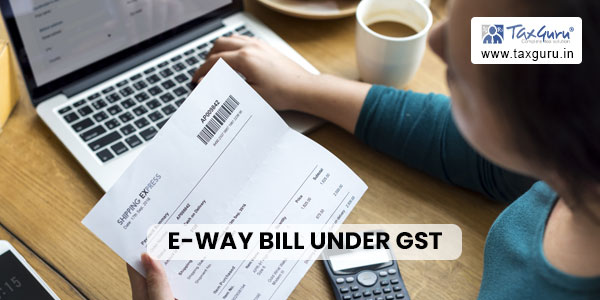Discover the essentials of E-Way Bill under GST Act 2017. Learn about the requirements, contents, and cancellation process. Understand the validity duration and extension possibilities.
E-way Bill is an electronically generated document that is required to be carried by a person in charge of the transport of consigned goods, which is valued at more than Rs. 50,000.
(Consignment value) in a vehicle from one place to another place.
Requirement of E-way Bill:
❖ Invoice/ Bill of supply/ Receipts relevant to the consignment of goods
❖ In case of transport by Road: Transporter ID or The vehicle number.
❖ In case of transport by Rail, Air, or Ship: Transporter ID, Transporter Documents, and Number and Date.
Contents of E-way Bill:
Part A Section of E-way Bill:
- GSTIN of supplier: If the supplier is unregistered, indicate ‘URP’.
- Place of Dispatch: Giving PIN Code of place of Dispatch.(Distance will be calculated automatically based on this PIN.
- GSTIN of Recipient : If the recipient is unregistered, indicate “URP’.
- Place of Delivery: Giving PIN Code of place of Delivery.
- Document Number: Tax invoice, bill of supply, delivery challan, or bill entry.
- Document Date: The date of the aforesaid documents should be supplied.
- Value of Goods
- HSN Code: Required as per provision related to tax invoice.
- Reason of Transportation: The reason for transportation should be mentioned. For Example Supply, Export/Import, etc
Part B Section of E-way Bill:
After Part A of the form is filled in, the next step is to fill in part B so that generation of the e-way bill is completed.

Part B should contain the following details:
❖ Vehicle RTO Number.❖ Transport Document Number.
The E-way bill is valid only when Part A and B are filled in and the e-way bill number is generated by the system.
Cancellation of E-way Bill:
If an E-way bill has been generated under rule 138 of CGST Rules, but the goods were never transported or are not transported as per the details entered in the E-way bill, then the generator can cancel the E-way bill on the portal, within 24 hours of generation of E-way bill – rile 138(9) of CGST Rules.
An E-way bill cannot be canceled if it is verified in transit in accordance with the provision of rule 138B.
It is not clear what the consequences would be if the transport cannot cancel the Eway bill. It is better to intimate the jurisdictional GST office about the issue in writing and get acknowledgment.
Duration of E-way bill :
Other than over-dimensional cargo:
For less than 100KM: 1 day
For every additional 100 Km: An additional 1 day
For over-dimensional cargo:
Up to 20 KM: 1 day
For every additional 20km and thereof: An additional 1 day
The extension is possible?
Yes, one can extend the validity of the E-way Bill. The transporter needs to explain the reason in detail while extending the validity period of an E-way bill.
From where E-way bill Generated?
Central Government has notified bellow portal for generating E-way bill: www.ewaybillgst.gov.in
More Articles on the e-way bill will follow.
Article by: Bhavana, Intern @ NRSR & Co, Manipal





